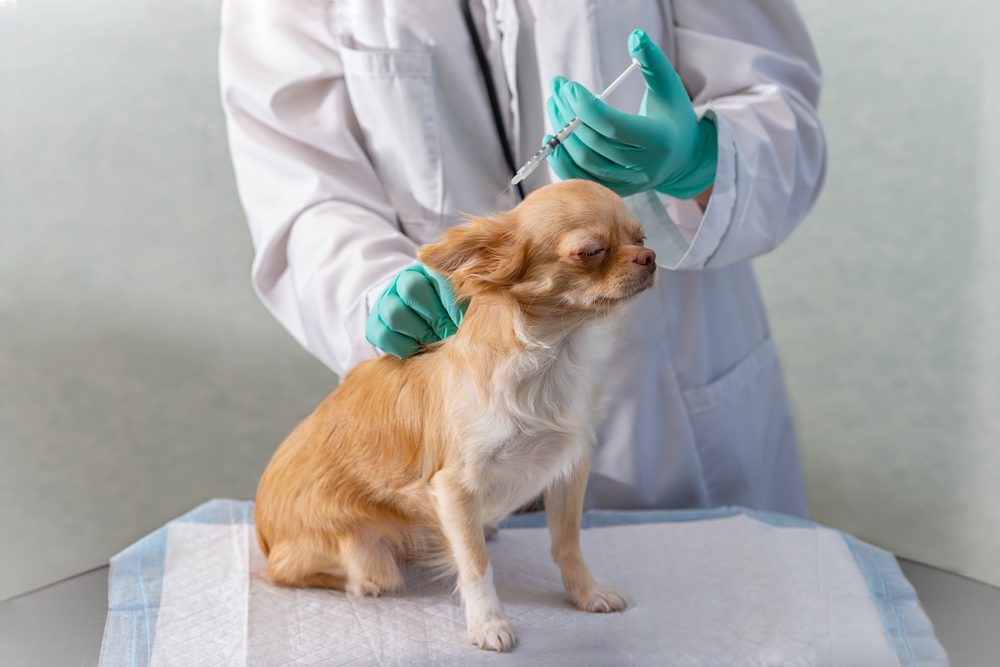All you need to know about vaccines will be a series of posts. There is too much important information regarding dog vaccines to put in one post. I’m writing this series of posts because I believe that every Chihuahua owner should be well informed about the vaccines that they put in their Chihuahua’s body.

INTRODUCTION — Part One
- How often should your Chihuahua be vaccinated?
- Each vaccine contains what?
- What disease does each vaccine prevent?
- Will vaccines benefit my Chihuahua?
- Am I putting my Chihuahua at risk by giving him yearly vaccines?
- My Chihuahua has cancer, heart disease, — fill in the blank — should he have his annual vaccines?
- My Chihuahua is a senior, should he have yearly vaccines?
- What studies have been done on vaccine protocol and what were the results?
In this series of posts, all those questions and more will be answered. Your Chihuahua can’t make these decisions for himself. Remember, you are your Chihuahua’s health advocate so you need to be well informed on this very important subject. By the end of this series, you will know the latest vaccine protocol. You will be able to make a decision regarding the necessary and not-so – necessary – Chihuahua vaccines. You will learn about the studies that have been done. You will know everything you need to know to make an informed decision regarding your Chihuahua and the necessary vaccines for him or her.
Benefits of Vaccines
There is no doubt that vaccines have saved the lives of many pets over the years, but they are not without risk. Many, understandably trust that whatever their vet recommends for their Chihuahua is the best way to go.

However, would it surprise you to learn that veterinarians don’t even agree on what ones are necessary and how often they should be given? Is your veterinarian up to date with the latest studies about vaccines? Maybe, maybe not.
Should You Rely Only On Your Veterinarian Recommendations?
Although veterinarians are absolutely necessary and most really care about your Chihuahua’s health and wellness, when it comes to vaccines, they can’t agree. So you can’t always depend on their recommendations when it comes to vaccines and what is in your Chihuahua’s best interest.

You don’t want to miss this very informative and important series on vaccinations and everything that you need to know. So be sure to sign up for our Weekly Tips email where you will be the first to know about the next installment in this series! (pssst, when you sign up you will get a FREE ebook on How to Housetrain a Chihuahua!
Don’t miss part 2 of this series: PART TWO



Where is my free ebook on how to house train a chi
I’m not sure I’m following you. It should be in your email, if not check your spam folder. Check that first. Did you sign up for it and not get it? If so, I’m terribly sorry. I’ll send you one, but I need to know what happened so I can fix it. :/ I need to know where exactly you saw it. please email me at linda@chichisandme.com to let me know. Thank you for bringing it to my attention.
Why do dogs have hot spot
Hi Betty! While your question is a little off-topic of vaccinations, it is a good question. Hot spots are red, inflamed skin lesions also known as pyotraumatic dermatitis or acute moist dermatitis. They can be found anywhere on a dog’s body, but the most common sites are the head, legs, and hips. These painful, smelly sores may be very obvious or may be hidden beneath matted fur. Hot spots are usually caused by self-trauma when a dog scratches an itchy spot so vigorously that he creates an open wound. Dogs scratch for many reasons but regardless of the cause, hot spots are bothersome. When a dog licks the sore spot, he irritates superficial nerve endings in the skin which stimulates more itching followed by more licking, biting, and scratching. This lick-itch-lick cycle is the basis for the self-trauma that causes hot spots. The initial itch may be from fleas or other insects, allergies, boredom, anxiety, dry skin, hormonal imbalance, or pain. If your Chi frequently gets hot spots, I suggest taking him to the vet to see if he/she can help you figure out the reason for the itching, then he/she will know how to treat it. Thanks for your question. ~ Linda